Research Area: Global Ethics, World's Religions
Civilizations, Religions and Economic Integration. Global Ethics (Doctorate) 10 ECTS
Doctorate in Ethics, Religions, and Business: Global Ethics, Islam, Christianity, Indian Religions, Buddhism, Chinese Religions, Orthodoxy, Other Religions, AI for Global Business. Thesis.
- Globalization and International Business
- Intercultural Negotiation
- Introduction to World's Religions
- Civilizations, Religions and Economic Integration
- Principles of a Model of a Global Ethics
- International Business without Corruption

Subject: Globalization and International Business.
- Positive and adverse effects of Globalization
- Cultural, political, and environmental dimensions of Globalization
- Globalization and international institutions:
- United Nations
- Conference on Trade and Development (UNCTAD)
- International Trade Centre (ITC)
- World Bank
- World Trade Organization (WTO)
- International Monetary Fund
- United Nations
- International Trade liberalization
- Role of WTO
- World Trade Agreements
- Regionalization, Emerging Markets and the BRICS Countries
- Emergence of the African Continent
- World Economic Crisis
Aims of the Subject:
- To learn about International Trade liberalization and the role of WTO
- To identify positive and adverse effects of Globalization
- To know trends towards Regionalization and the African emergence
- To understand the various regional trade agreements
Subject: Intercultural Negotiation.
- Intercultural Management and International Business
- High and low context cultures (Edward Hall)
- Cultural dimensions of Hofstede (Power distance, Individual, and Long-Term Orientation)
- Cross-cultural communication and International Marketing Plan
- Key strategies for dealing with new cultures
The purposes of this subject are:
- To understand the nature of different cultures of the World
- To learn how to negotiate with people from other cultures
- To know how to adapt International Marketing strategies to these particularities
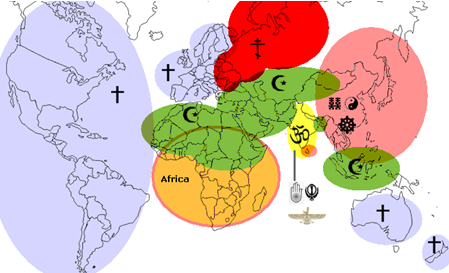
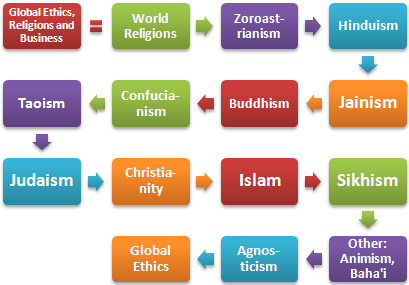
Subject: World's Religions.
6,000 million people worldwide, (84% of mankind) states belongs to some Religion
- Introduction to World's Religions
- Is humanity religious?
- Influence of religion on Global Business
- Religious variables and International Marketing strategies
- Religions influence on current economic integrations of civilizations of the World
Religions & Global Business
- Cultural influence of religion in global business
- Spiritual Globalization
- Faith-based Marketing
- Faith-Sensitive Business Leadership
- Religion and ethical frameworks
- Influence of religion on financial systems
- Religion and international contracts
- Religion and export prices
- Religion and international product
- Religion and global distribution
- Religion and international promotion
- Religious differences and ethical conflicts
- Religious risks for the global enterprise
- Religious diversity and geopolitical tensions
- Business strategies to successfully adapt to religious diversity
- Cultural intelligence and Religious diversity
- Engaging religious leaders as a business strategy
- Religious influencers and business

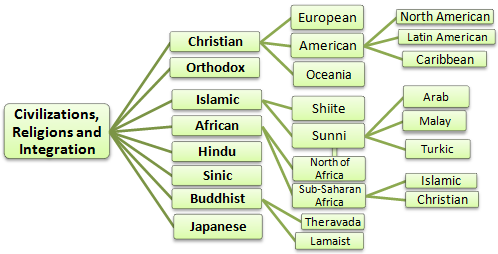
Subject: Civilizations, Religions, and Regional Economic Integration.
- Civilizations in a globalized world
- The eight major civilizations and their economic areas
- Economic Area of African Civilization: West Africa, Central Africa, Southern Africa, East Africa and the Maghreb
- Economic Area of Islamic Civilization: Arab, Central Eurasia, Malay
- Economic Area of Western Civilization: Europe, North America, Latin America, The Caribbean, Oceania
- Economic Area of Sinic Civilization (China)
- Economic Area of Hindu Civilization (India)
- Buddhist Economic Area
- Economic Area of Orthodox Civilization (Russia)
- Integration process between civilizations
- Economic interrelations among civilizations

Subject: International Business without Corruption.
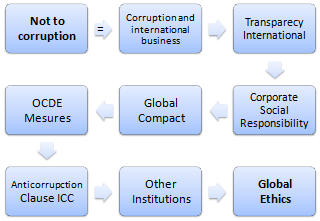
Corruption: 5% of the World's GDP!
- No to Corruption in International Business
- African Union Convention on Preventing and Combating Corruption
- Global Compact of the UN.
- UN Convention against Corruption
- Anti-corruption Clause of the International Chamber of Commerce
- OECD Anti-corruption Measures
- Other initiatives
- Role of Transparency International
- Introduction to the Corporate Social Responsibility
Aims of the Subject:
- To raise awareness about the terrible effects of corruption
- To analyze the causes of corruption in Global Business
- To learn about the tools that a company can implement to fight against corruption

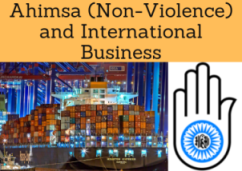

Subject: Principles of a Model of Global Ethics.
- The Sri Ramakrishna Principle of Truthfulness and Harmony of Religions as a pillar of Global Ethics
- Compatibility of the Sri Ramakrishna Principle of Harmony of Religions with World's Religions
- Personalities and Businesspeople who apply the principle of Harmony of Religions
- Influences of the Sri Ramakrishna Principle of Harmony of Religions on Global Business
2- Ahimsa Business (Non-Violence).
- Introduction to Jain and Hindu concept of Ahimsa (non-violence)
- Compatibility of the Ahimsa Principle with World's Religions
- Ahimsa (Non-violence) as a pillar of Global Ethics
- Ahimsa in thoughts, words, and actions (Zoroastrianism)
- Personalities who have applied the Ahimsa principle of Non-Violence
- Implications of the Ahimsa Principle for Global Business and International Marketing
- Analysis of some businesspeople implementing an Ahimsa strategy
3- Why do we need a global ethics?.
- Implications of Global Ethics on International Business and Globalization
- Some cases of Businesspeople who apply a Model of Global Ethics:
Aims of the subject:
- To define the pillars of a Model of Global Ethics
- To understand World's Religions as sources of a Model of Global Ethics
- To analyze the two fundamental principles of Global Ethics: Ahimsa (non-violence) and Harmony of Religions
- To reflect the impact of the Model of Global Ethics on International Business
- To analyze the profile of Businesspeople who apply a Model of Global Ethics
 Enrol / Request for Information
Enrol / Request for Information

 Doctorado en Religiones y Negocios Internacionales
Doctorado en Religiones y Negocios Internacionales  Doctorat en éthique, religions et affaires
Doctorat en éthique, religions et affaires
 Doutoramento em Ética, Religiões e Negócios.
Doutoramento em Ética, Religiões e Negócios.
(c) EENI Global Business School (1995-2025)
Top of this page










 WhatsApp
WhatsApp